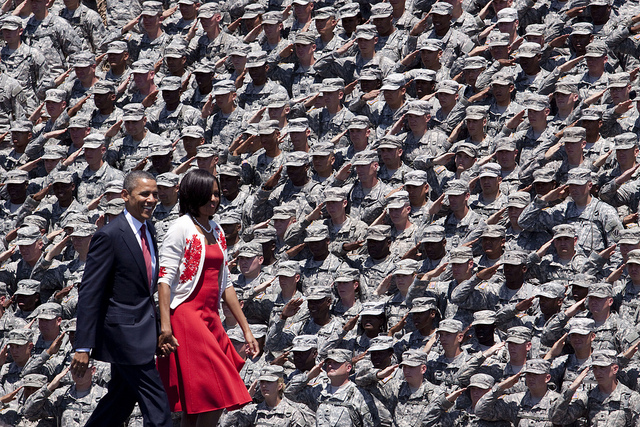Like this article? rabble is reader-supported journalism. Chip in to keep stories like these coming.
“While most states have an army, the Prussian army has a state,” said Voltaire.
Much the same could be said of the United States of America. On the world list of biggest military spenders, its total expenditure roughly equals those of the next nine countries combined.
In 2015, U.S. Special Operations forces deployed to 147 countries. According to the late Chalmers Johnson, the U.S. maintains some 737 military bases on foreign soil.
Hawaii Democratic Congresswoman Tulsi Gabbard supports Bernie Sanders, not Hillary Clinton. For the Iraq veteran, THE issue in the 2016 election is ending interventionist wars. She believes Sanders would spend trillions where it is needed — on American public infrastructure — not on foreign military wars.
Based on a series of interviews ranging back to 2002, the April issue of the Atlantic features an eye-opening account by specialist Jeffrey Goldberg of how Barrack Obama became disenchanted with the Washington playbook that presidents are supposed to follow on foreign policy.
Responses to events “tend to be militarized responses,” Obama told Goldberg. President Obama denounced routine calls for military intervention to quell upsets in overseas hotspots: “the playbook can also be a trap leading to bad decisions.”
Obama points to the failure of the Libyan intervention as the moment when he realized Washington establishment thinking was flawed.
The U.S. invaded two Muslim countries, Iraq and Afghanistan. It cost the U.S. $4 trillion to remove Saddam Hussein from Iraq; he was replaced by the Islamic State. The U.S. now fights the Islamic State instead of Hussein. U.S. troops remain deployed in Afghanistan with no end in sight.
As a Middle East policy, war-making has been absurd by any standards of success.
Against advice from Secretaries of State Clinton and Kerry, think-tanks, pundits, and Republicans and Democrats alike, Obama decided not to invade a third Muslim state, Syria.
Today, even Donald Trump has recognized that fighting both the Syrian government and its Islamic State opponents at the same time makes no sense. Yet, the Washington establishment War Party continues to be widely critical of Obama for his reluctance to send American troops to fight whoever in Syria.
In the same issue of the Atlantic as the Goldberg interview, GOP spear-carrier David Frum and Harvard historian Niall Ferguson throw verbal darts at Obama for failing to conform to Washington think.
The Middle East now has less strategic influence for the U.S. than it is supposed to have, Obama told Goldberg, because dependency on foreign oil imports has declined.
Goldberg questioned Obama about whether he favours American “retrenchment.” The president pointed out that superpowers get in trouble when they “over-reach.”
In the same interview, Obama’s evident enthusiasm for a pivot to Asia is a reminder of his determination to maintain American preeminence in the world. American economic power declines as China rises? Support the Trans-Pacific Partnership, an ill-advised corporate-driven attempt to force Chinese trading partners to play by rules set by the U.S., and limit the ability of China to play by its own rules in Asia.
Obama brags about American domination of the world agenda. Since he was elected, no summit meeting has taken place where we do not the set the agenda, he told Goldberg.
Obama talked to Goldberg about plans to put an American naval base in Vietnam, noting that 80 per cent of the population now looks favourably on the U.S., over 40 years after U.S. military helicopters evacuated the last soldiers left in Saigon.
The U.S. defeat handed out in Vietnam traumatized the Washington establishment and ultimately destroyed president Lyndon Johnson. If anything, it reinforced the hand of the American military, which argued successfully that it was forced to fight with one hand tied behind its back.
The bloated American military-industrial complex identified by Eisenhower in his farewell address has turned the great neighbour to the south into a military democracy.
After the fall of the Berlin wall in 1989, NATO should have been disbanded, and U.S. military spending cut way back.
Instead, to satisfy the hunger of military contractors, Bill Clinton expanded NATO to the Russian borders, igniting a second Cold War with Russia, and opening a market to keep General Dynamics-made tanks rolling off assembly lines in Ohio.
Last week Obama entertained Justin Trudeau. A deal for Canada to purchase 65 U.S.-made F-35 first-strike aircraft was supposed to be dead. Trudeau said as much in the 2015 election campaign. It turns out the F-35 deal is just in intensive care. Industrial offset spending has kept the purchase alive.
This week Obama travels to Cuba. His goal is to end a long-standing irritant with Latin America: the American boycott of the island regime. It began after the 1960 U.S. Bay of Pigs invasion failed to arrest the Cuban revolution.
U.S. military and intelligence incompetence in Cuba caught President Kennedy off guard, though he had been warned by outgoing president Eisenhower of the limits of military judgement.
Obama will have a similar message to deliver to his successor, who may or may not be listening.
Duncan Cameron is the president of rabble.ca and writes a weekly column on politics and current affairs.
Photo: Sgt. Uriah Walker/The U.S. Army/flickr
Like this article? rabble is reader-supported journalism. Chip in to keep stories like these coming.



